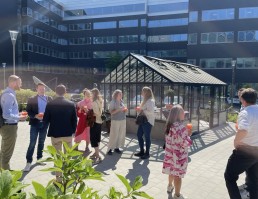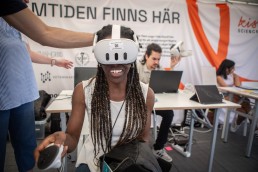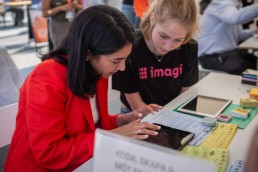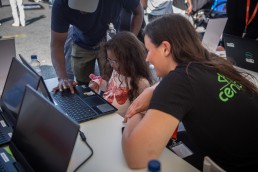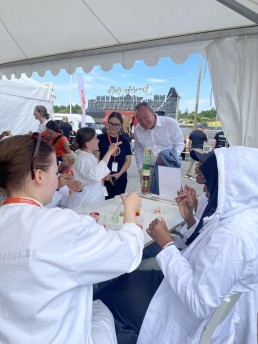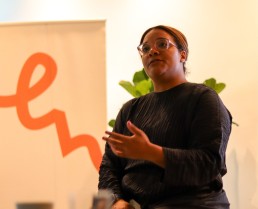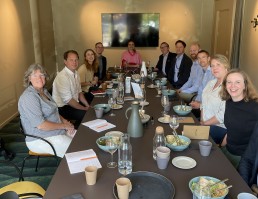Kistas community inspirerar fler unga till en framtid inom teknik och vetenskap
Under Järvaveckan samlade vi Kistas community för att inspirera fler unga att välja en karriär inom tech och banbrytande teknologier. Köerna ringlade sig till Kistas tält där nyfikna kunde prova på VR-glasögon, regnbågsexperiment och att koda tillsammans med Kodcentrum.
Järva är framtiden – i dubbel bemärkelse. Här hittar du den största andelen unga i Stockholmsområdet, och här bygger vi transformativ teknologi för en hållbar framtid. Därför handlade de flesta diskussionerna och samtalen om vilka karriärsval, studier eller jobb som faktiskt finns att välja på – och hur man närmar sig dem steg för steg.

Vi behöver intressera fler unga till en framtid inom teknik och vetenskap.
En del av det arbetet kan göras genom att koppla samman aktörerna i Kista för att inspirera Järvas unga. Vi gör det tillsammans i ett starkt community. Årets närvaro på Järvaveckan arrangerade vi tillsammans med Kodcentrum, KTH, Rookie Startups, IBM, Ericsson, Stockholms Universitet, Vetenskapens Hus, imagilabs och The Kloud som är Kistas samlade fastighetsbolag.
Flera politiker besökte oss. Särskilt det biträdande finansborgarrådet Anders Österberg och Lawen Redar hängde kvar, löste kodutmaningar och småpratade med arrangörer och besökare.
Ett stort tack till alla som hälsade på i tältet, och ett extra stort tack till alla partners som hjälpte till med allt från experiment till att diskutera drömmar och framtidsplaner.
Arbetet med att öka intresset för teknik och vetenskap genom att stärka och vidga relationen mellan Järva och Kistas näringsliv fortsätter. Vill du vara med? Hör av dig till Mikaela Färnqvist på Kista Science City.

AI and the state of democracy
On May 22, we gathered the Kista Science City community for a deeep dive in artificial intelligence and democracy. Moderated by Binette Seck, this event featured Dr. Heather Ashby, a former US Government Security and Foreign Affairs Specialist. Dr. Ashby shared her expertise on how emerging technologies are reshaping our political landscape and transforming democratic processes and political campaigning.
The impact of AI on elections
In 2024, more than half of the world’s population are heading to the polls. These elections are happening during a perfect storm of new AI tools becoming available. Dr. Ashby highlighted India’s election as an example, noting the unprecedented use of generative AI. This election offers a glimpse into the future of voting processes influenced by AI, with tools generating deep-fake videos, memes, and audio to manipulate public opinion on an never-before-sen scale. This situation creates massive challenges for maintaining fair and transparent elections, demanding attention from policymakers and tech developers alike.
Harnessing AI for positive change
Despite these challenges, AI technologies have the potential to strengthen electoral processes. Several countries are already using AI to enhance democratic engagement. For instance, AI-powered chatbots provide up-to-date information on voting, candidates, and the electoral procedures, helping voters make informed decisions and increasing overall participation in democratic processes. These developments are crucial in countering misinformation and ensuring accurate information reaches the public.
To fully realize the benefits of AI and integrate it responsibly into societies, Dr. Ashby highlighted several important steps:
- Education and empowerment: It is crucial to educate people on what AI is and what it isn’t to dispel myths and fears. Clear and accessible information can help the public understand AI’s capabilities and limitations.
- Transparency and accountability: Regulations like GDPR are vital for ensuring transparency in how AI systems operate. Transparency builds public trust and holds tech companies accountable for their actions.
- Training for officials: Elected officials need adequate training in technology to create effective legislation. Without proper knowledge, the legislative process can fall behind.
- Addressing underlying issues: Tackling challenges like economic disparity, lack of education, and social injustice helps create a stable foundation for the responsible use of AI.
Looking forward: AI and democratic potential
When asked what she looks forward to in the fields of AI and democracy, Dr. Ashby expressed optimism. “I look forward to people, and the power of people, and their ideas. When you get people together to brainstorm and create something different, that’s what gives me hope,” she said, emphasizing the value of collective creativity and collaborative spirit of individuals to drive positive change and innovation. By harnessing the diverse perspectives and talents within society, we can develop AI technologies that not only support democratic values but also enhance them.
The conversation with Dr. Ashby underscored the critical impact of AI on elections and democracy, highlighting both opportunities and challenges. As AI continues to evolve, fostering discussions that balance technological advancements with democratic values remains essential. Stay tuned for more events and insights on this crucial topic.

Drone adaptation in cities
The integration of drones into urban environments can transform the way we live and work, offering solutions for a wide range of applications. As this technology evolves, it is essential to address the challenges and opportunities that come with it to fully harness its potential.
To explore these important topics, we recently brought together top experts from academia, industry, and the public sector for a roundtable event. The discussion focused on EU’s ambitious drone strategy for 2030, evaluating Sweden’s readiness and outlining the steps needed to ultimately incorporate drones into everyday life.
Discussion takeaways
Drones offer significant potential for current and future business applications across various sectors. This underscores the importance of innovation, adaptability, technological advancements, and, not least, a robust regulatory framework for their integration into society. Additionally, there is a strong need for clear public communication to inform people about drones—their potential to promote sustainable urban development, as well as the challenges associated with their use.
The discussion wrapped up with a consensus on several key points, including:
- The necessity of a national drone strategy for Sweden.
- Initial implementations should focus on areas like outer city regions, healthcare, and emergency and rescue services to effectively demonstrate the benefits of drones to the public.
- Learning from successful models in other countries, notably the Netherlands.
Participants expressed a strong interest in continuing these discussions, focusing on how Sweden can remain a leader in innovation and address questions about funding drone infrastructure, public acceptance, and the future of urban drone integration.
For more information and to stay updated on future discussions, visit kista.com and join the conversation on the future of drone technology.
